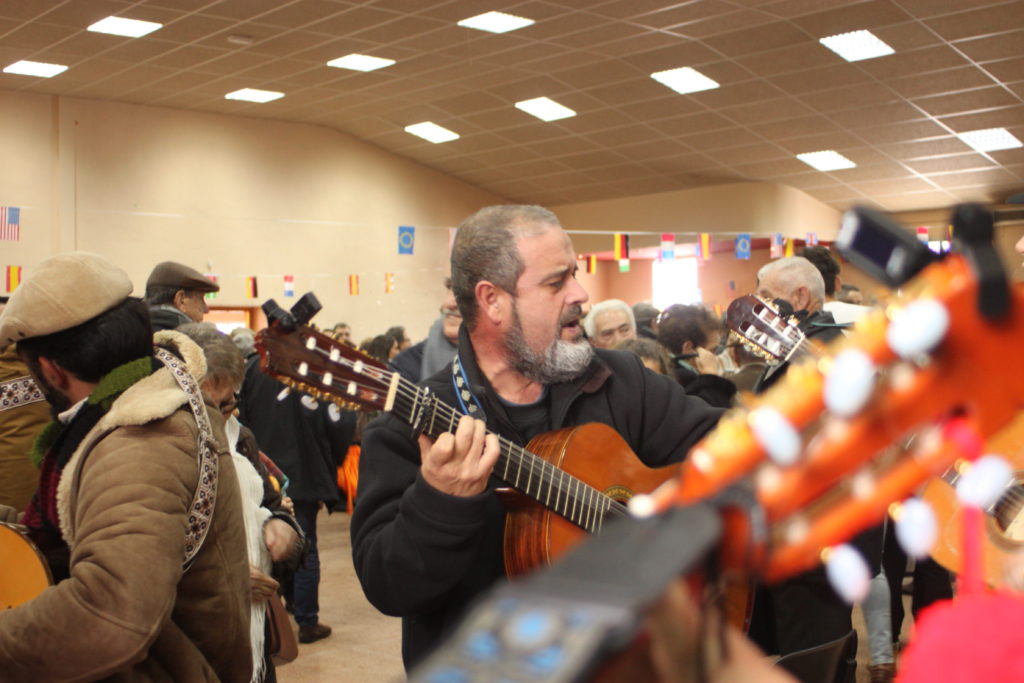普通话传记
The history of Vigüela is the story of a vital surrender to a cultural legacy of a wild and very ignored beauty: the traditional music of the center of the Iberian Peninsula.
Vigüela was born in the mid-80s, like many other groups of young people who, after the Franco regime, sought in the popular manifestations of their land a way to channel their creative desires, without having to adopt musical styles that were alien to them.
However, Vigüela always sounded different. Why? Surely, the anecdote that Juan Antonio Torres explains in the booklet of the album A Tiempo Real will help us glimpse that why:
When I was about 20, I went to Menasalbas, Toledo province, to visit Tía Chata, a great jota singer. I had brought my guitar and began to play but the lady didn’t sing…
After some attempts, she said: ‘Dear boy, you don’t know how to play the jota. Wait until my husband comes from work, he will show you.’
When her husband arrived at dusk, he took my guitar, used a pencil tied with twine for a capo, set it on the first fret and began to play. His right hand played a rhythm, I didn’t know. It was the accompaniment Tía Chata needed to sing jota and that I was not providing to her. That way of playing seemed to be easy but, when I tried to make it for her to sing, I was unable. She had showed me that I didn’t know how to play jota even though I thought I did, from songbooks.”
 For Juan Antonio this marked the beginning of a search for ways to perform for Tía Chata’s and earlier generations. He also encountered young people who could play jota ‘Tía Chata’s way’, which is necessary to convey the huge emotional messages of the songs.
For Juan Antonio this marked the beginning of a search for ways to perform for Tía Chata’s and earlier generations. He also encountered young people who could play jota ‘Tía Chata’s way’, which is necessary to convey the huge emotional messages of the songs.
A musical legacy that does not need romantic or ethnographic justifications to be valued.
With their music Vigüela want to enable people of different ages to interact and enjoy it and to maintain their intergenerational connection.
To this end they use the traditional methods and styles. They discovered that attempts to fit the music of the people into ‘academic’ schemes like bars, tunings, time signatures, etc., lead away from the ancestral ways. Traditional performers don’t understand the academic concepts of performing and are precluded from participating, when done that way.
Vigüela is the first group to take the traditional styles (jota, seguidilla, fandango, son), interpreted as in their natural environment, with a large part of improvisation, and with an approach of artistic excellence, to the international professional stages of music of the world.
They have performed at referencial festivals, such as WOMAD UK, Forde in Norway or Klangkosmos programming, with 12 concerts in Germany. In 2019 they performed in Spain, Poland (May and July), Germany, Slovenia (photo below, at Okarina festival in Bled), Portugal, Serbia and Uzbekistan.
They have conducted music and dance workshops in Spain, England, Poland, Cyprus, Sweden, Germany and the Czech Republic.
Vigüela has 10th albums. From the 7th to the 9th have been published and distributed internationally by the British label ARC Music. The 10th one, We, by Mapamundi Música. Check Discography for more details.
The focus of the work is, as we said, of artistic excellence. In the international market, ethnographic or identity value is not enough to sustain a product, if it does not have an intrinsic artistic value. And, at the same time, our music transmits the differential elements of this artistic corpus, without mannerism.
More about the core members
In alphabetical order:
Carmen (Menchu) Torres. Voice and percussions. Native from El Carpio de Tajo.
“Vigüela is my second family. I enjoy a lot learning with the group, it helps me to break away from the daily routine. In summary, I have great fun because I like a lot to dance, sing and work with them.”
Juan Antonio Torres. Voice, percussions, guitar, rebec. Native from El Carpio de Tajo.
“Thanks to Vigüela I can confirm that my work and my research about these kinds of music is not only my own personal truth, but also my partner’s. A real pleasure.”
Mari Nieto. Voice and percussions. Native from El Carpio de Tajo.
“To be part of Vigüela means a lot to me. It is not only a pleasure: it is also a honor. It has given me the chance to discover, enjoy and learn from “the best ones””.